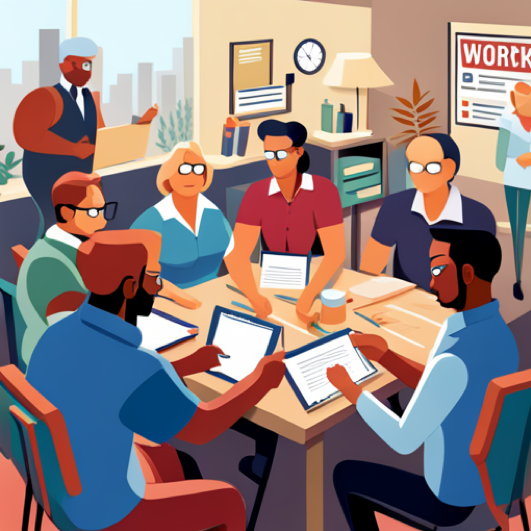The Importance of Effective Engagement in Community Relations
The Transformative Role of Community Workshops in Strengthening Community Engagement and Inclusivity

Community workshops are a great way of bringing people together to discuss, learn, and work towards common goals in a collaborative environment. They serve as a platform for individuals to share their knowledge and experiences and collaborate on projects aimed at improving the well-being of their communities. Recently, people have noticed the potential these workshops have as a powerful tool for fostering community engagement and inclusivity.
The concept of community workshops comes from the idea that people have a wealth of knowledge and skills that can be harnessed for the greater good. By providing a space for people to come together and learn from one another, these workshops empower community members to actively shape their collective future. From skill-sharing sessions and participatory planning exercises to interactive dialogues on pressing social issues, community workshops offer a diverse range of activities that cater to different interests and abilities so that everyone can get involved.
In this article, we will explore the transformative role community workshops play in strengthening community engagement and inclusivity. We will look at how they promote community engagement, foster inclusivity, and forge collaborative partnerships for their successful implementation. By the end of this article, you will have a better understanding of the importance of community workshops in creating vibrant, resilient, and inclusive communities.
How Community Workshops Promote Community Engagement
Community engagement is the process by which individuals and groups actively participate in the life of their community. It encompasses a wide range of activities, from attending local events and meetings to volunteering for community-based initiatives. It is all about building relationships and fostering a sense of belonging among community members.
Community workshops are crucial for promoting community engagement as they provide a space for people to come together and collaborate on projects that matter to them. They give people the chance to contribute their unique skills and perspectives and to learn from the experiences of others. This collaborative approach encourages people to take control of their community's development and fosters a sense of collective responsibility and pride.
On top of this, community workshops give participants the chance to better understand the issues that affect their communities. By engaging in open and honest discussions, individuals can identify the root causes of challenges and find potential solutions. This process of collective problem-solving not only strengthens community engagement but also builds trust and social cohesion among communities.
Lastly, community workshops provide a space for people to develop new skills and knowledge. Participants can gain useful skills that they can use in both their personal and professional lives through interactive learning sessions and hands-on activities. This process of continuous learning and growth enhances community engagement and empowers individuals to become agents of change in their communities.
Fostering Inclusivity through Community Workshops
Inclusivity ensures that everyone, regardless of their background, identity, or abilities, has an equal opportunity to participate in and contribute to the community. It is a vital part of community development, as it allows diverse voices to be heard and valued and creates a sense of belonging.
Community workshops foster inclusivity by providing a safe and welcoming space for people from all walks of life to come together and collaborate. Organisations can make sure that all participants feel valued and included by building workshops that cater to different interests, abilities, and learning styles.
One key aspect of fostering inclusivity in community workshops is actively engaging marginalised and underrepresented groups. This can be done by reaching out to these groups through targeted outreach efforts and partnering with various organisations that serve these populations. By getting these groups involved in the planning, implementation, and evaluation of workshops, organisers can ensure that their unique needs and perspectives are considered.
Furthermore, community workshops can promote inclusivity by providing accessible and culturally appropriate materials and resources. This means using plain language, offering translation services, and incorporating culturally relevant examples and case studies into each workshop. By being accommodating to everyone involved, organisers can create a more inclusive learning environment.
Lastly, these workshops can foster inclusivity by encouraging participants to share their experiences and perspectives. By providing opportunities for open communication and attentive listening, organisations can promote a sense of mutual respect and understanding among participants. This inclusive approach not only improves the educational experience but also aids in removing obstacles and bridging gaps within the community.
Collaborative Partnerships for Successful Community Workshops
The success of community workshops depends on the collective effort of various stakeholders, including community members, local organisations, and government agencies. By creating collaborative partnerships, organisers can make use of each partner's unique strengths and resources to create powerful workshops that genuinely resonate with the community.
Community-based organisations and local government organisations are crucial collaborations to take into account. The preparation and execution of community workshops can greatly benefit from the quantity of information and resources that these organisations typically possess. By working together, they can ensure that workshops are aligned with the community's goals and priorities and integrated into existing programmes and initiatives.
Another crucial partnership is between community workshop organisers and local businesses. Organisers can secure financial support, in-kind donations, and volunteer resources for their workshops by getting the private sector involved. In return, businesses can benefit from more visibility, positive community relations, and opportunities for employee engagement.
Lastly, collaborative partnerships should also be forged among community members themselves. Organisations can make sure that the workshops properly reflect the community's needs and aspirations by involving residents in the planning, implementation, and evaluation of the workshops. This inclusive approach promotes ownership and pride among participants and aids in the workshops' long-term sustainability.
Conclusion
Community workshops can completely transform communities by promoting engagement, fostering inclusivity, and forging collaborative partnerships. These can empower individuals to actively shape their community's future and contribute to creating more vibrant, resilient, and inclusive communities.
By understanding the transformative role of community workshops, community members, organisations, and government agencies can unite to design and implement effective workshops that meet the needs and aspirations of their communities. This collaborative approach can be incredibly powerful.



